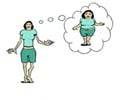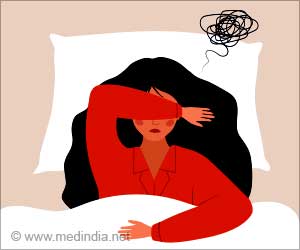People with anorexia nervosa - eating disorder face inner conflicts and suffer between their real and inauthentic self, suggests study.

The researchers also conclude that exploring ideas of authenticity may help clinicians formulate therapeutic approaches and provides insights into whether compulsory treatment can be justified.
For the study, researchers in the U.K. interviewed 29 women who were being treated for anorexia nervosa at clinics throughout the south of England.
The interviews asked questions about how the women view their condition, including their understanding of it, how they feel about compulsory treatment, and their thoughts about the impact of anorexia on decision-making.
Although the researchers did not ask about authenticity or identity, almost all of the participants spoke in terms of an 'authentic self'.
Participants characterized this relationship in different ways. Many saw anorexia nervosa as separate from their real self, some expressed the idea of a power struggle between their real and inauthentic self while the others said that other people could provide support to enable the authentic self to gain strength within the struggle.
Advertisement
"Conceptualizing the anorexic behavior as an inauthentic part of the self may well be a valuable strategy for many in helping to overcome it," the authors said.
Advertisement
"Some authorities argue that compulsory treatment should never be used for anorexia nervosa," they said.
"We believe, however, that we should take seriously the possibility that a person in the throes of anorexia nervosa may be experiencing substantial inner conflict, even though the person may not be expressing that feeling at the time."
"perhaps the evidence from these accounts is sufficient to override treatment refusal in the persons best interest."
Source-ANI









